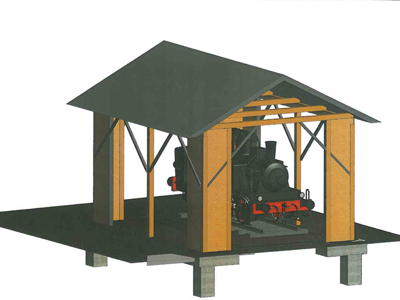As reported in June, 2014, Engine #1, known as the “Tea Kettle,” was recently returned to Jacksonville after being purchased by the Jacksonville Heritage Society, Inc., a local 503 (c) 3. Funding was made possible by Mel and Brooke Ashland, owners of the historic Bigham Knoll Campus. The Ashlands had been negotiating for over six years with the Engine’s owner in California to bring her home. They feel its return will spark a revival in interest in restoring an important component of Jacksonville’s local legacy: the importance of rail transportation.
Shortly before the Engine arrived back in Jacksonville after a long absence, volunteers from the Medford Railroad Club built replica tracks on the Bigham Knoll Campus where the Engine now rests. The tracks are in the very right of way on which Engine #1 traveled between Jacksonville and Medford, starting on January 16, 1891. Engine #1, built in 1890, was the original Engine used by the Rogue River Valley Rail Road (RRVRR) that operated passenger and freight service until the railroad’s dissolution in 1925. The rail line hooked into the original Oregon & California/Southern Pacific rail lines. Today, one can view and walk along the original rail tracks from 1891, running along “C” Street and in front of the Visitors’ Center, which was the original Train Depot. The tracks once ran from about a mile west of town through the Bigham Knoll Campus and into Medford.
Today, a collaborative effort is underway to construct a shelter for the Engine. A group of students and their instructors from the Rogue Community College School of Construction Technology and Management are working with local engineers, planners and other volunteers to construct a “rail shed,” a protective building which will house the iconic Engine and protect it from the elements. Under the umbrella of the Jacksonville Heritage Society, on which Brooke Ashland serves as Chair, the project is being designed and built by RCC building trades students. Structural engineering is being done by Jacksonville’s Mike Thornton Engineering. Jacksonville’s Mike Burrill, Jr. of Burrill Construction is donating the historic beams and trusses that will be used to replicate the Depot. Based on drawings, the look of the train shed will be patterned after typical rail depots built across the nation during the turn of the last century.
For many years, Rogue Community College Construction Technology students have partnered with local organizations to complete community building projects using student talent. Some of the student projects include improvements to the Bear Creek Greenway, boat docks at local lakes, and building improvements for the Girl Scouts, Dunn House, YMCA, and the College.
Students work on these projects in groups, as part of their class instructional time, earning credit toward a Cooperative Work Experience (CWE) coursework or a college internship. The project, if approved by the Jacksonville Planning Department and the Historic and Architectural Review Committee (HARC), will be on a tight schedule since the concrete foundation must be poured before the onset of winter. At this time, building applications have been submitted and are awaiting approval so that the project can break ground and be completed in time for RCC students to receive their grades.
The Ashlands hope this will serve as a pilot program for future collaboration between RCC and the City of Jacksonville. Brooke Ashland told us, “One of the problems we had in restoring the 1908 School House was finding qualified labor that had experience with older structures and designs. If any of these students working on the Train Depot project gets excited about the importance of historic restoration as a career direction, there are plenty of projects waiting for them in Jacksonville. In fact, the Courthouse comes to mind immediately!”
